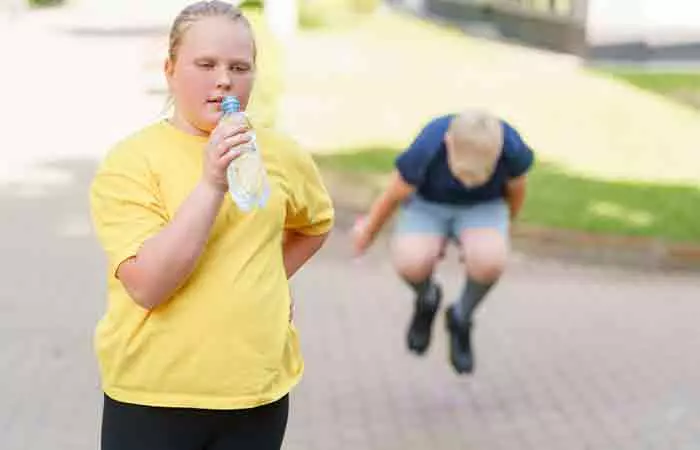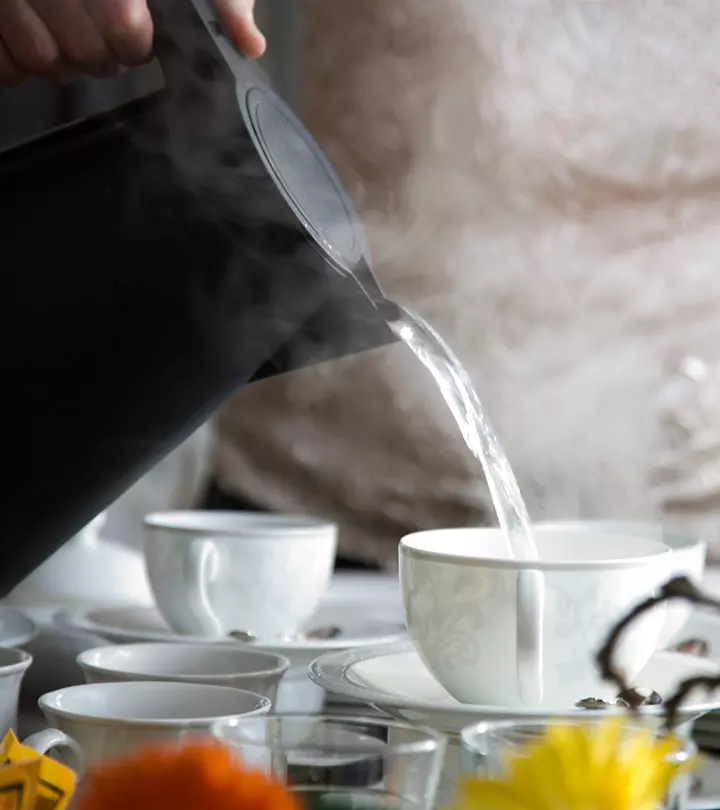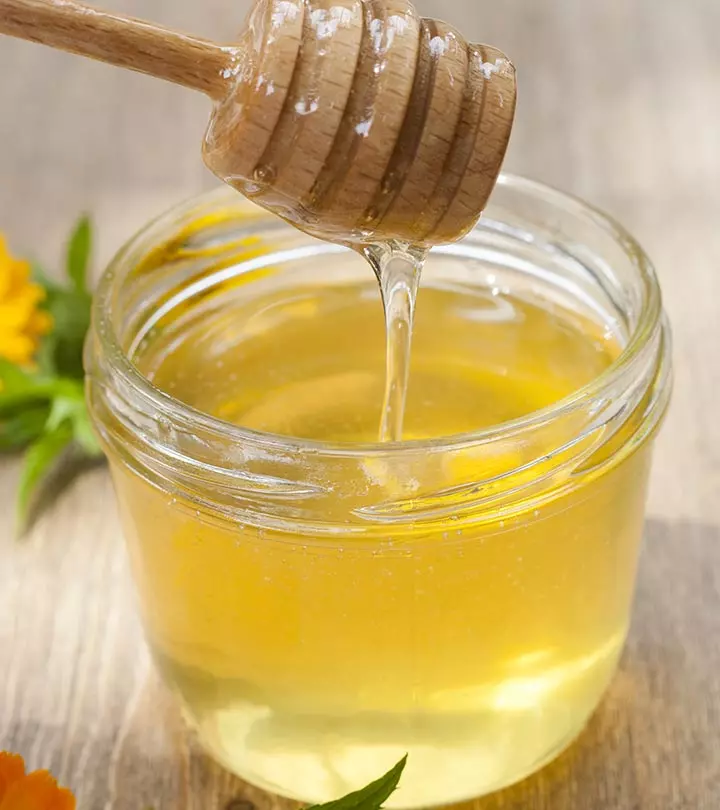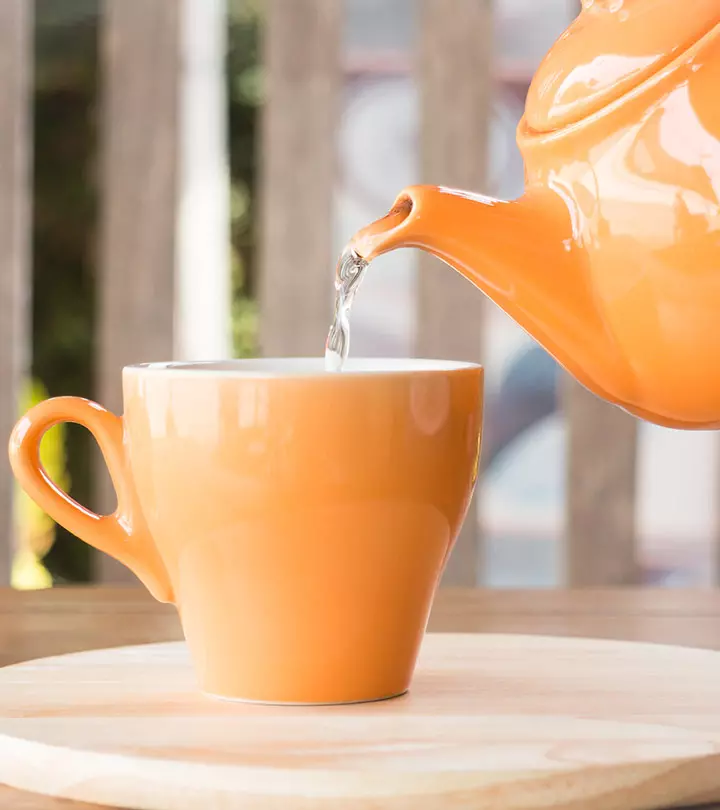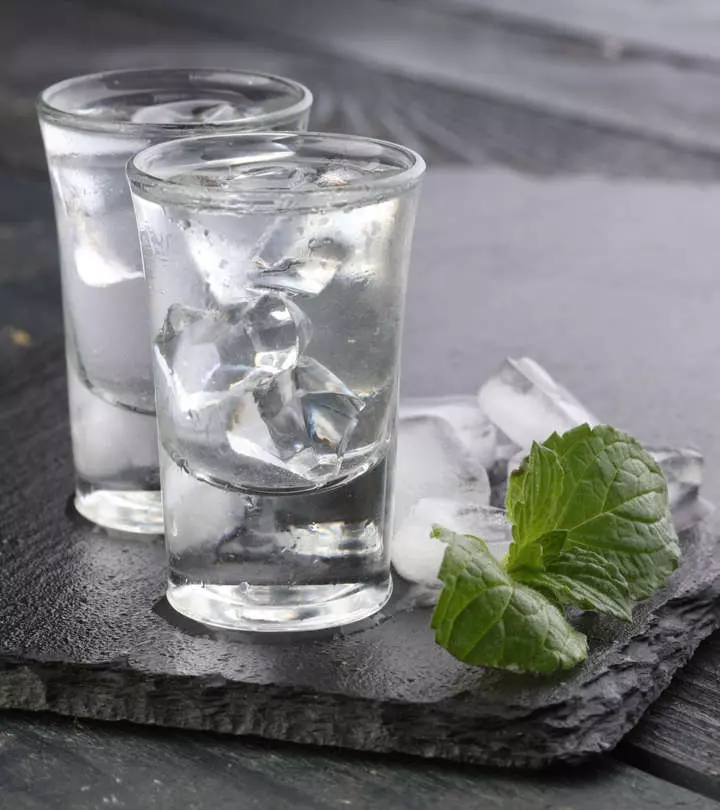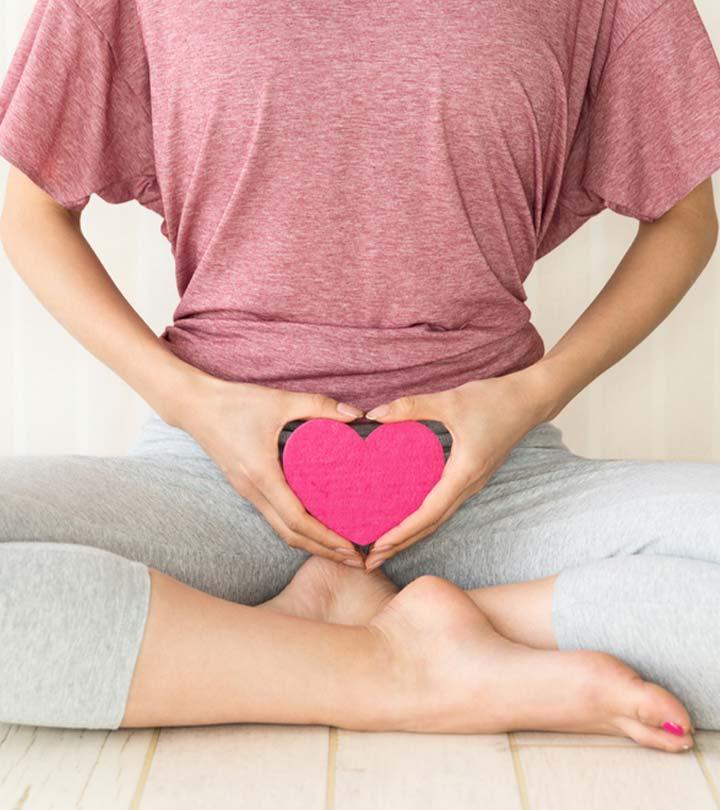5 Health Benefits Of Drinking Cold Water & Risks
They say drinking cold water does more harm than good. Learn the truth about it.

Image: Shutterstock
Medical experts always recommend drinking 8 to 10 glasses of water every day for clearer skin, increased endurance, and better physical and mental health. But does drinking cold water regularly affect your health negatively? Just like everything else in this world, research suggests that there are a few risks and benefits of drinking cold water. We will take a deeper look at it in this article to find out what they are. Scroll down to read more!
In This Article
Why Can Cold Water Be Bad For You?
 Quick Tip
Quick TipMany believe that drinking cold water may do more harm than good. It is said that cold water may cause your stomach to contract, making the digestion process difficult. Some individuals also believe that their body will have to work harder to maintain the optimal inner temperature (37°C) if they drink water at 4°C or less.
But how much of this is true? In the following section, we will look at what research states.
Research
In a small study published in Chest, cold water intake was found to make nasal mucus thicker, making it difficult to pass through the respiratory tract. Alternately, consuming hot water (or hot beverages, like chicken soup) was observed to make breathing easier. Cold water was also found to aggravate congestion in individuals with cold or flu (1).
 Quick Tip
Quick TipIn another study, drinking cold water was linked to migrainesi A neurological condition characterized as a type of severe headache that causes intense pain, nausea, and sensitivity to light. in people with a history of the condition (2). Cold water intake may also aggravate the pain associated with achalasia (a condition that makes it difficult for food to pass through the esophagus) (3).
According to Chinese medicine, drinking cold water with meals is believed to create an imbalance within the body. Hence, meals from Chinese culture (and several other cultures) are served with warm water.
Anecdotal evidence suggests that drinking cold water leads to reduced heat exhaustion. Drinking cold water is also associated with a reduced risk of heat stroke, as it keeps the body cool (or regulates the body temperature during hot summer days). It may also lead to a reduced risk of dehydration, and reduced risk of kidney stones. Drinking cold water on particularly hot days during summer can lead to an enhanced mood.
Though cold water appears to do more harm, it does have certain benefits.
Benefits Of Drinking Cold Water
1. Balances Body Temperature Post Workout
Drinking cold water may reduce heat exhaustion and prevent your body from overheating after a rigorous workout session. The intake of cold water supports post-workout recovery and makes it easier for your body to maintain a lower core temperature and supports detoxification (4).
2. May Provide Energy
Drinking cold water may also help keep you alert and reduce fatigue, leading to increased energy than usual throughout the day. However, concrete research is lacking in this aspect.
3. May Promote Energy Expenditure In Overweight Children
It is common knowledge that drinking water can aid digestion. It may also help with weight maintenance. Drinking cold water has been found to increase resting energy expenditurei Number of calories burned by the body during the interprandial state (the resting period between meals). in overweight children (5).
Coldwater intake alone may not aid weight loss. It may, however, jump-start the process.
4. May Relieve Symptoms Of Tonsillitis
Anecdotal evidence suggests that cold water may temporarily soothe symptoms of tonsillitis, such as throat pain and discomfort. It may also help relieve pain after tonsil removal surgery. However, a research study published in the Iranian Journal of Otorhinolaryngology suggests that cold liquids and foods may have no effect on it (6). Therefore, it is best to listen to your body and consult a doctor to adjust the drinking water temperature to what provides the most relief.
5. May Help With Acidity
According to traditional Persian medicine, sipping cold water without ice may help treat symptoms of gastroesophageal reflux disease and other gastrointestinal (GI) problems, such as acid reflux. The slow sipping technique gives your GI system enough time to prepare for water intake (7). However, there are no studies that state the same. While cold water may temporarily relieve you from symptoms of acidity, it cannot address its root cause.
These are some advantages of drinking cold water. But does it mean that cold water is the way to go? How about warm water?
Is Warm (Or Hot) Water Better Than Cold Water?
Drinking warm water has its pros and cons. Warm water can aid digestion, support improved respiratory health, promote improve circulation, help with reduced bloating, and help your body get rid of toxins faster (8). But drinking warm water may make you less thirsty. This could be a problem in the hot temperatures as your body tends to lose more water through sweating.
Fumiko Takatsu, a vlogger, talks about the reasons she prefers drinking hot water (even at restaurants) in one of her YouTube videos. “It [hot water] really detoxifies my system. And when I feel like my body’s clean, I feel more energy, and I feel good, and it shows on my skin (i),” she states.
Cold water, in general, can keep you hydrated. But is cold water bad for you? Truth be told, it may negatively impact health in many ways. It may not be a great idea when you have a cold or flu, as it may slow down recovery. Cold water may also slow down digestion in adults.
You can take a few sips of cold water after a rigorous workout. But after a heavy meal (or when you have the flu), hot/warm water could be your best bet.
Infographic: Alternatives To Drinking Cold Water
While you may choose to drink cold water as a thirst quencher, sipping plain water all day long may seem a bit boring. Don’t worry. You can spice up things by replacing cold water with other homemade beverages to keep up your hydration levels. Have a look at the infographic below and know your options.
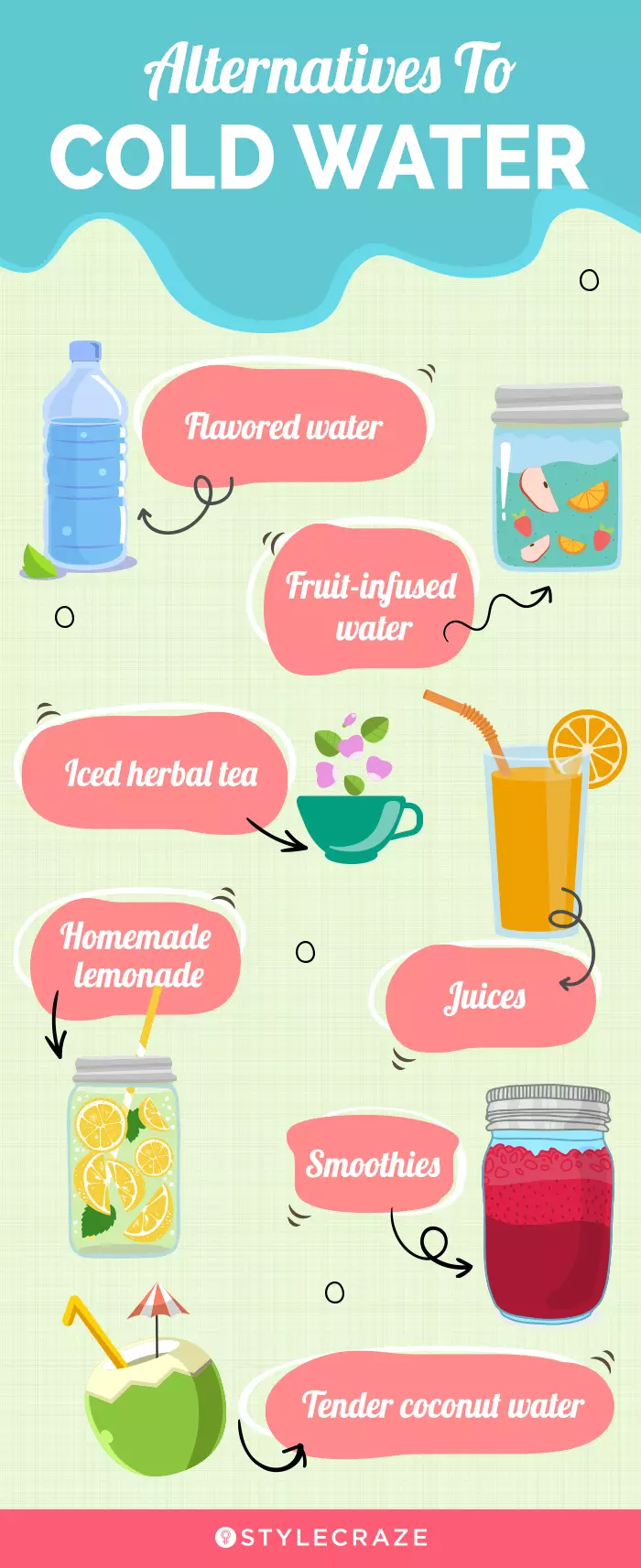
Illustration: StyleCraze Design Team
With the above benefits of drinking cold water, you may want to make it a habit for yourself. While it may seem to help boost energy and balance the body temperature, it can also lead to migraine and digestive issues. On the other hand, while drinking warm water can help boost digestion, lead to improved brain function, improved cardiovascular health, reduced muscle soreness, and help detoxify the body, it may make you less thirsty leading to chances of dehydration in hot and humid places. Moreover, drinking water may also help with blood sugar control. So depending on the place, weather, and your health conditions, you may prefer one over the other.
Though cold water inherently is not bad, it may cause issues in some people. Hence, check your health and the time of the day (or the season) to decide what works best for you.
Frequently Asked Questions
Is it better to drink room temperature water?
Water at room temperature (or plain water) could work best in most cases as it is loaded with electrolytes. But if you are working out, sipping on some cold water can help. Warm water, on the other hand, can come to your rescue during the flu season and give you the much-needed metabolism boost.
Can drinking cold water help with weight loss?
While drinking cold water will not have a drastic effect on weight loss, it may increase your resting energy expenditure. This may help jump-start weight loss, though there is a lack of concrete evidence in this regard.
Is it bad to drink cold water on a hot day?
Drinking icy cold water on a hot day may cause harm. It can cause esophageal spasmsi Sudden contractions of the esophageal muscles (tube connecting mouth to the stomach) that cause intense pain and difficulty swallowing. and abdominal cramps. It may also lead to lowered body temperature and a drop in heart rate.
Is cold water good for the face?
Cold water therapy, also called hydrotherapy, helps tightens the skin pores, promotes balanced pH levels, and makes you look refreshed.
Does drinking cold water affect sperm count?
Possibly. Some animal studies suggest that drinking ice-cold water too often may reduce sperm count and motility (9). More research is warranted in humans.
What happens when you drink cold water on an empty stomach?
Drinking cold water on an empty stomach may restrict digestion and contract blood vessels. However, limited data is available to prove these claims.
Key Takeaways
- Drinking cold water after workouts may help balance body temperature.
- It may help provide more energy as well as help in digestion.
- However, cold water decreases internal body temperature and may lead to decreased metabolism.
- People suffering from migraine, cold, flu, or headache should avoid cold water as it may worsen the condition.
Drinking cold water can be bad for your health. It can cause digestive issues, headaches, and even fatigue. Check this video to know more!
Personal Experience: Source
StyleCraze's articles are interwoven with authentic personal narratives that provide depth and resonance to our content. Below are the sources of the personal accounts referenced in this article.
i. Reasons Why I Drink Hot Water Dailyhttps://www.youtube.com/watch?v=JVENlOpCW0Y
References
Articles on StyleCraze are backed by verified information from peer-reviewed and academic research papers, reputed organizations, research institutions, and medical associations to ensure accuracy and relevance. Read our editorial policy to learn more.
- Saketkhoo, K et al. “Effects of drinking hot water, cold water, and chicken soup on nasal mucus velocity and nasal airflow resistance.” Chest vol. 74,4 (1978): 408-10.
https://pubmed.ncbi.nlm.nih.gov/359266 - Mattsson, P. “Headache caused by drinking cold water is common and related to active migraine.” Cephalalgia : an international journal of headache vol. 21,3 (2001): 230-5.
https://pubmed.ncbi.nlm.nih.gov/11442559 - Ren, Yutang et al. “Response of esophagus to high and low temperatures in patients with achalasia.” Journal of neurogastroenterology and motility vol. 18,4 (2012): 391-8.
https://pubmed.ncbi.nlm.nih.gov/23105999/ - Lafata, Danielle et al. “The effect of a cold beverage during an exercise session combining both strength and energy systems development training on core temperature and markers of performance.” Journal of the International Society of Sports Nutrition vol. 9,1 44.
https://www.ncbi.nlm.nih.gov/pmc/articles/PMC3472188/ - Dubnov-Raz, G et al. “Influence of water drinking on resting energy expenditure in overweight children.” International journal of obesity (2005) vol. 35,10 (2011): 1295-300.
https://pubmed.ncbi.nlm.nih.gov/21750519 - Meybodian, Mojtaba et al. “Effect of Cold Diet and Diet at Room Temperature on Post-Tonsillectomy Pain in Children.” Iranian journal of otorhinolaryngology vol. 31,103 (2019): 81-86.
https://www.ncbi.nlm.nih.gov/pmc/articles/PMC6449532/ - Nimrouzi, Majid, and Babak Daneshfard. “Drinking water in traditional Persian medicine: Do’s and don’ts.” Electronic physician vol. 9,5 4330-4331. 25 May. 2017
https://www.ncbi.nlm.nih.gov/pmc/articles/PMC5498696/ - Patel, Suchita, et al. “SAY YES TO WARM FOR REMOVE HARM: AMAZING WONDERS OF TWO STAGES OF WATER!” EUROPEAN JOURNAL OF PHARMACEUTICAL AND MEDICAL RESEARCH.
https://www.ejpmr.com/home/abstract_id/220 - Ghafour Saeedy, Said Abdul, et al. “Long-Term Ice-Cold Water Drink Induced Testicular Damage and Altered Sperm Characteristics in Rats.” Traditional and Integrative Medicine, 2021,
https://www.researchgate.net/publication/348410460_Long-Term_Ice-Cold_Water_Drink_Induced_Testicular_Damage_and_Altered_Sperm_Characteristics_in_Rats
Read full bio of Lucas Aoun
Read full bio of Arshiya Syeda
Read full bio of Payal Karnik







